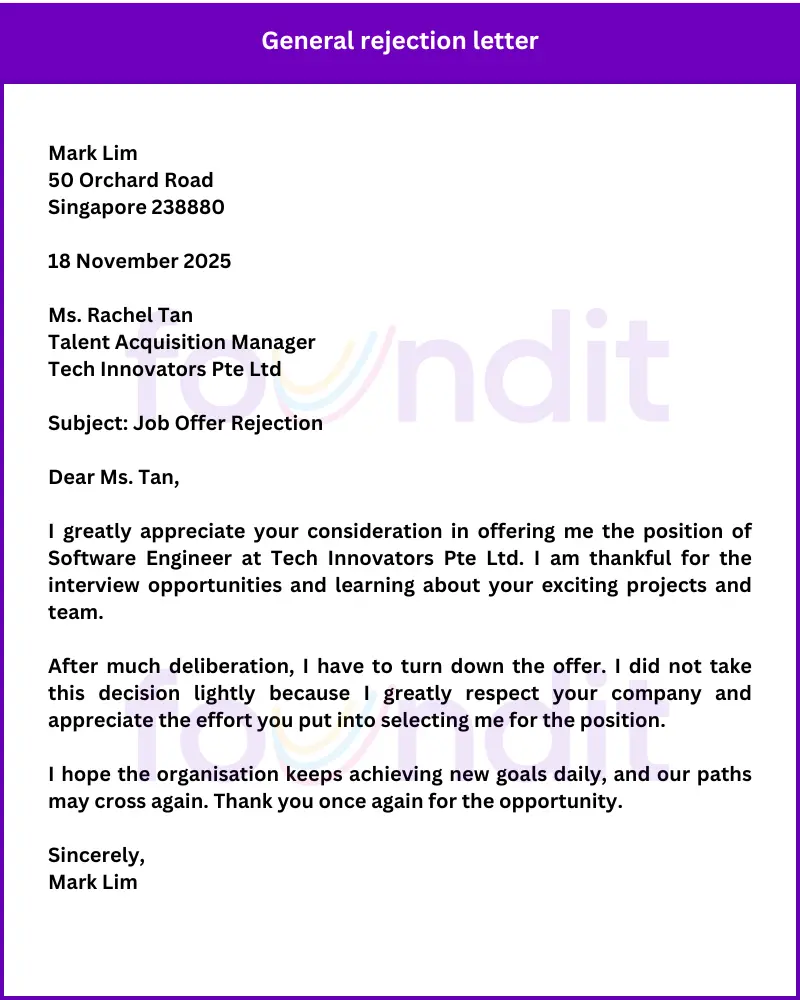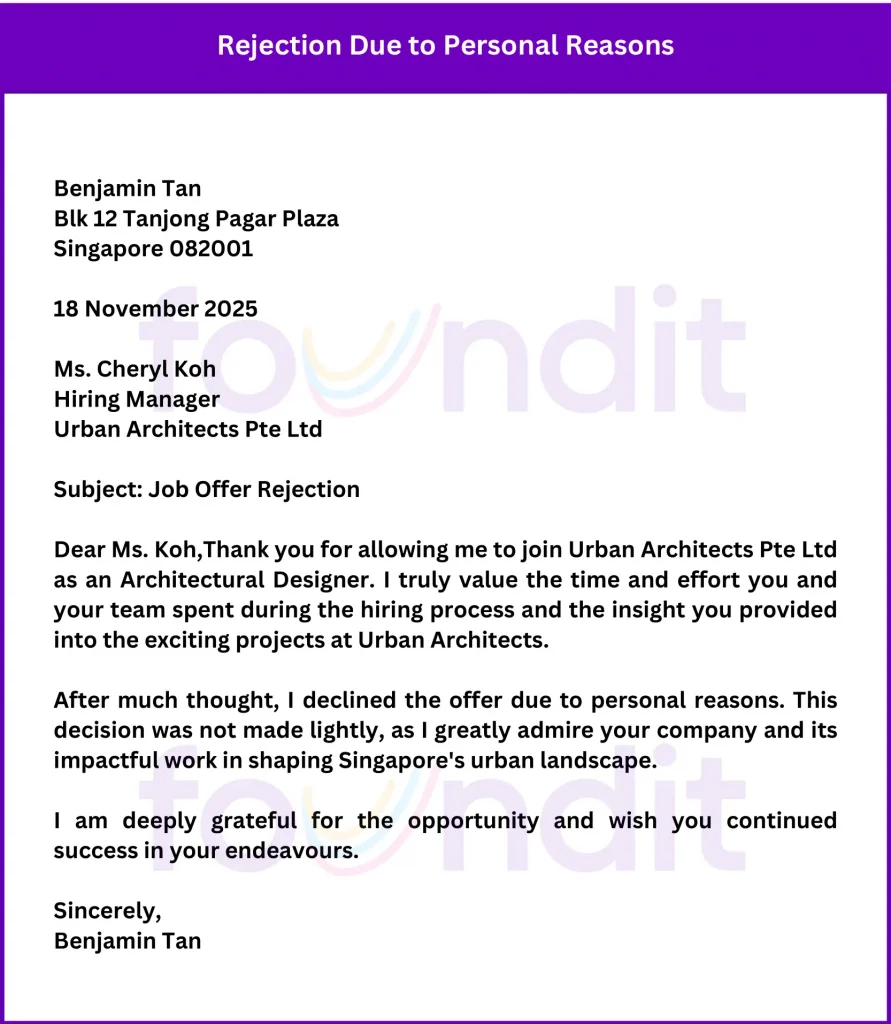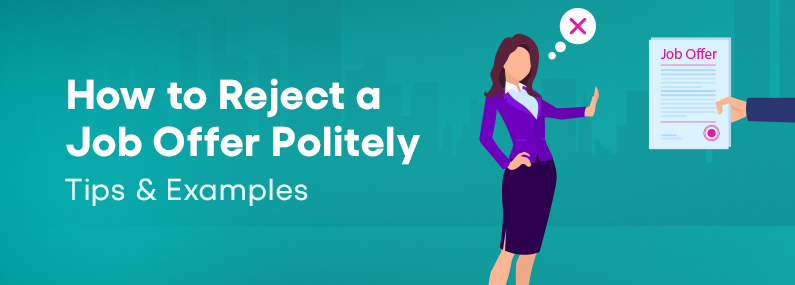Rejecting a job offer is by no means a straightforward task. It necessitates tact, finesse, and professional decorum. The employer has allocated time and assets to evaluate your candidacy, just as you’ve committed to exploring the potential opportunity. Knowing how to reject a job offer politely and professionally ensures respect for that mutual investment.
However, why does this matter? Because the professional sphere is interwoven. How one declines an offer can leave lasting impacts, potentially affecting future dealings with the employer or industry associates. A respectful rejection opens avenues for forthcoming prospects, constructs goodwill, and reflects one’s integrity. So, allow us to help you understand how to reject a job offer.
1. Things to Consider Before Rejecting the Offer
Before deciding to reject a job proposal, take time for introspection. While declining is an option you’re entitled to choose, the ramifications could influence your career trajectory, your rapport with that employer, and your reputation across industries. So weigh these factors carefully:
1.1 Evaluate the Offer Carefully
Step away from your emotions and re-examine the job proposal comprehensively. Consider the full package, including:
- Remuneration: Are the pay, bonuses, and other incentives proportionate to your budget?
- Benefits: Search for medical insurance, retirement plans, paid vacations, and other non-monetary perks.
- Growth Avenues: Assess whether the role provides professional evolution, training, or a clear career advancement roadmap.
- Company Culture: Research the organisation’s principles and work environment to confirm their alignment with your preferences.
- Work-Life Balance: Ensure the job’s demands don’t clash with your priorities.
Sometimes, an offer that doesn’t seem great on the surface may hold some hidden opportunity for growth or learning. Don’t let that slip through your fingers.
1.2 Be Certain About Your Decision
Once you decline, it’s challenging to revisit the decision. Take the time to ensure your choice is final. Consider questions like:
- Is this job aligned with my long-term career goals?
- Am I turning this down for valid reasons or acting on impulse?
- Could I regret declining this offer later?
Weighing these factors helps you approach your decision thoughtfully and confidently.
1.3 Timing Matters
Respecting a potential employer’s schedule by reacting promptly is prudent. Recruiters have deadlines and alternative applicants under consideration, so avoid delaying their process.
Ideally, respond within a day or two after making your decision. If you need more time, communicate your need for an extension rather than leaving the employer in the dark.
1.4 Keep the Door Open
Even if the immediate role isn’t ideal, the company may soon have positions aligning closer with your aims. A well-mannered, professional refusal can maintain the possibility of future opportunities. Expressing appreciation for the company or interest in staying connected may go quite far.
You May Also Like: Top 4 Checklist to Check Before Accepting Offer Letter
2. How to Reject a Job Offer Politely
Once you’ve decided to decline an offer, conveying this decision becomes crucial. Here’s a step-by-step guide to rejecting a job offer with grace and professionalism.
2.1 Respond Promptly
Delaying your response can come across as inconsiderate, especially if the company is waiting for your decision to proceed with other candidates. Prompt communication reflects respect for their time.
- If possible, respond within 24–48 hours of making your decision.
- A delayed response may inconvenience the employer and reflect poorly on your professionalism.
2.2 Choose the Right Communication Method
The medium you choose to decline the offer can impact how your message is received.
- Email: An email to refuse a job offer is the most common and professional method. This will serve as a written record of your decision and allow you to craft your message carefully.
- Phone Call: This is more appropriate for senior-level positions or if you’ve built a close relationship with the interviewer. A phone conversation adds a personal touch and shows respect for their time.
- In-Person (Rare): Only for situations where a strong personal rapport has been established, such as within smaller companies or startups.
2.3 Start with Gratitude
Gratitude sets a positive tone and softens the impact of rejection. Acknowledge the effort the employer put into the hiring process. For example:
- “Thank you for offering me the position of [Job Title]. I truly appreciate the time and resources your team invested in considering me for this opportunity.”
This small gesture goes a long way in maintaining goodwill.
2.4 Be Direct but Polite
Avoid ambiguity when rejecting the offer. Be clear about your decision while sounding polite. For example:
- “After thoroughly thinking about the opportunity, I have decided to decline the offer for the [Job Title] position.”
Avoid using phrases that suggest uncertainty, such as “I’m not sure this is the right time” or “I might need to decline.” Be firm yet respectful.
2.5 Provide a Reason (Optional)
You’re not obligated to provide a reason for declining, but offering one can provide closure to the employer. Keep it professional and avoid being overly critical. Examples include:
- “I have accepted another job offer that aligns more closely with my long-term career goals.”
- “I’ve decided to pursue a different opportunity that better matches my current priorities.”
- “Due to personal reasons, I am unable to accept the position at this time.”
2.6 Stay Positive and Professional
Your tone should reflect gratitude and respect. Avoid making negative comments about the company, hiring process, or role. Focus on the positives, such as your appreciation for the offer or admiration for the company.
2.7 Offer to Stay in Touch (If Appropriate)
If you believe there’s potential for future collaboration, express an interest in staying connected. For example:
- “I greatly admire your organisation and hope to have the opportunity to work together in the future.”
Networking is valuable, and a professional rejection can turn a declined offer into a long-term connection.
2.8 Keep the Message Brief and to the Point
Brevity is essential when rejecting a job offer. Employers appreciate clarity and directness, which helps them move forward with their hiring process. Avoid unnecessary elaboration or lengthy justifications, which can confuse your message and detract from the professionalism of your response.
For example:
- “I have decided to not take up the opportunity as it doesn’t align with my current career goals.”
A clear, concise message avoids potential misinterpretation, saves time for both parties, and ensures your professionalism shines through.
2.9 Express Gratitude Again in the Closing
Ending your message with gratitude leaves a positive final impression. It’s a way to acknowledge the employer’s time, effort, and interest in you while ensuring your rejection feels considerate and respectful. Gratitude is a cornerstone of professional communication, and reiterating it in the closing shows that you value the opportunity—even if you’re not accepting it.
Consider a warm and appreciative closing like:
- “Thank you once again for offering me this role. I truly respect the work your team does and wish you continued success.”
- “I deeply appreciate the chance to interview with you and learn about your team. I hope our paths cross again in the future.”
2.10 Proofread Your Message
Proofreading your rejection message is a vital step that many overlook. Typos, grammatical errors, or a careless tone can undermine the professionalism of your communication, leaving a less favourable impression. Take a moment to review your message to ensure it’s polished, polite, and conveys your decision accurately.
3. Writing a Job Offer Rejection Letter
A well-crafted job offer rejection letter is essential for maintaining professionalism, even when declining an offer. While the news might be disappointing, how you communicate your decision can preserve relationships and leave the door open for future opportunities.
3.1 Key Elements to Include
You must consider certain aspects while drafting a letter to decline a professional opportunity. Some of the major elements that you shouldn’t skip including in your job offer rejection letter are as follows:
- Gratitude
Start by showing appreciation to the recruiter for offering you the job. Acknowledge their time and effort in hiring and express genuine appreciation for the opportunity. A little gratitude can go a long way in maintaining goodwill.
Example: “Thank you so much for extending the offer for the [Job Title] position. I truly appreciate the time you and your team dedicated to the interview process.”
- Clear Rejection
It’s crucial to state clearly and respectfully that you are declining the offer. Being direct prevents any confusion and ensures that your intentions are understood.
Example: “After careful consideration, I have decided to respectfully decline the offer.“
- Reason for Declining (Optional)
While not required, providing a brief and professional explanation for your decision can be appreciated. If you choose to provide a reason, keep it positive and non-critical—such as accepting another offer, personal circumstances, or career alignment.
Example: “I have decided to accept another opportunity that will take me closer to my long-term career aspirations.“
- Maintain Professionalism
Even if the decision to decline wasn’t an easy one, it’s important to express a positive view of the company or the hiring process. This maintains respect for the organisation and the team involved.
Example: “I have been very impressed with your company’s mission and the professionalism demonstrated throughout the interview process.“
- Future Connection (If Appropriate)
If you’re interested in staying connected, mention that you want to keep in touch for potential opportunities. This leaves the door open for future engagements.
Example: “I hope to stay in touch, and I would be open to future opportunities with your organisation.“
3.2 Tone
The tone of your job offer rejection letter should always be polite, gracious, and professional. Maintaining a positive tone is key even if you’re declining an offer you weren’t thrilled about. A rejection letter is an opportunity to demonstrate your communication skills and leave a lasting good impression.
Being polite ensures you remain respectful of the employer’s time and efforts. A gracious tone shows appreciation for the offer and acknowledges the value of the opportunity. Finally, keeping the message professional ensures that the employer sees you as someone who takes communication seriously and values the organisation.
4. Job Offer Rejection Letter Template
Following a specific structure for drafting a letter to decline a job offer can make it look more organised and professional. In case you are wondering how to decline an offer, here’s a sample structure of a rejection letter:
| [Your Name] [Your Address] [Date] [Hiring Manager’s Name] [Company Name] Subject: Job Offer Rejection Dear [Hiring Manager’s Name], I sincerely thank you for selecting me for the [Job Title] position at [Company Name]. I truly appreciate the time and effort you and your team invested throughout the interview process and for considering me for the opportunity. After considering everything, I have decided to respectfully decline the job offer. While I am impressed with [Company Name] and the team, I have pursued another opportunity that more closely aligns with my long-term career goals. I want to let you know that I deeply appreciate this impeccable opportunity to meet with you and learn more about your organisation. I have great respect for the work [Company Name] is doing, and I hope that we may have the chance to work together in the future. Thank you again for your kind offer and understanding. I hope you keep shining in your future endeavours. Sincerely, [Your Name] |
5. Examples of Job Offer Rejection Letters
We have already discussed the key points to remember while writing an email to decline a job offer. Now, check out a few samples of how to write an email turning down a job offer:
5.1 Example: General rejection letter
| Mark Lim 50 Orchard Road Singapore 238880 18 November 2025 Ms. Rachel Tan Talent Acquisition Manager Tech Innovators Pte Ltd Subject: Job Offer Rejection Dear Ms. Tan, I greatly appreciate your consideration in offering me the position of Software Engineer at Tech Innovators Pte Ltd. I am thankful for the interview opportunities and learning about your exciting projects and team. After much deliberation, I have to turn down the offer. I did not take this decision lightly because I greatly respect your company and appreciate the effort you put into selecting me for the position. I hope the organisation keeps achieving new goals daily, and our paths may cross again. Thank you once again for the opportunity. Sincerely, Mark Lim |

5.2 Example: Rejection Due to Accepting Another Offer
| Sophia Ng Blk 25 Bukit Timah Road Singapore 259711 18 November 2025 Mr. Jason Chua Human Resources Manager Green Solutions Singapore Subject: Job Offer Rejection Dear Mr. Chua, Thank you for offering me the position of Marketing Executive at Green Solutions Singapore. I truly appreciate the time you and your team took to share insights about your organisation and the exciting work you do in sustainable initiatives. However, I have decided to accept another offer that matches my current career aspirations. This decision was not made lightly, as I have the utmost respect for Green Solutions Singapore and the values it represents. Thank you once again for the opportunity to join your team. I wish you every success and hope that our paths may cross again in the future. Sincerely, Sophia Ng |

5.3 Example: Rejection Due to Personal Reasons
| Benjamin Tan Blk 12 Tanjong Pagar Plaza Singapore 082001 18 November 2025 Ms. Cheryl Koh Hiring Manager Urban Architects Pte Ltd Subject: Job Offer Rejection Dear Ms. Koh,Thank you for allowing me to join Urban Architects Pte Ltd as an Architectural Designer. I truly value the time and effort you and your team spent during the hiring process and the insight you provided into the exciting projects at Urban Architects. After much thought, I declined the offer due to personal reasons. This decision was not made lightly, as I greatly admire your company and its impactful work in shaping Singapore’s urban landscape. I am deeply grateful for the opportunity and wish you continued success in your endeavours. Sincerely, Benjamin Tan |

5.4 Example: Rejection While Expressing Future Interest
| Amelia Wong Blk 145 Clementi Avenue 3 Singapore 120145 18 November 2025 Mr. Darren Lee Head of Recruitment Global FinTech Solutions Subject: Job Offer Rejection Dear Mr. Lee, I would like to thank you for offering me the Data Analyst role at Global FinTech Solutions. It was a pleasure learning about your innovative projects and the exciting contributions your team is making in the financial technology sector. After much consideration, I have decided to decline the offer. While I am unable to accept this position at this time, I remain deeply impressed by your organisation and the opportunities it offers. I hope to stay connected and would be thrilled to be considered for any future roles that align with my experience and career goals. Please feel free to reach out if there are any suitable opportunities in the future. Thank you again for extending this offer, and I wish continued success to the whole organisation. Sincerely, Amelia Wong |

6. Final Steps After Rejecting the Offer
Once you have rejected an offer, you should take steps that won’t prevent you from securing better opportunities in the future. After turning down a job offer, keep in mind the following:
6.1 Stay Professional
After rejecting a job offer, leaving a positive impression is crucial. Respond graciously and maintain a polite tone throughout all your communications. Promptly replying to follow-up questions or offering to connect the company with other potential candidates can further showcase your professionalism.
6.2 Update Your Network
Keep in touch with the hiring manager or recruiter. A simple follow-up email can help maintain a relationship with the company. Building such connections can open doors to future opportunities that may align better with your career goals.
6.3 Reflect on the Process
Take some time to evaluate your interaction with the company. Was the organisation appealing? Did the role align with your long-term aspirations? These reflections can guide you in determining whether you’d like to pursue opportunities with them later.
Conclusion
Turning down a job offer gracefully is as important as accepting one. A thoughtful and professional rejection leaves the door open for future interactions and enhances your reputation in the professional world. Networking is a continuous process, and maintaining positive relationships with companies can benefit your career in unexpected ways. Always handle rejections with tact, kindness, and respect for the employer’s time and effort.
You May Also Like:
- How to Resign Effectively: Tips, Templates & Examples
- Best Answer to “How Can You Contribute to the Company?”
FAQs on Turning Down a Job Offer:
Q1: Is it unprofessional to reject a job offer?
A1: No, rejecting a job offer is not unprofessional if done thoughtfully and respectfully. It’s better to decline an offer than to accept it and later regret your decision.
Q2: Should I give a reason for rejecting a job offer?
A2: Providing a reason is optional. However, a brief explanation, such as accepting another offer or aligning better with personal goals, can provide closure to the employer.
Q3: How soon should I reject a job offer after receiving it?
A3: You should inform the employer as soon as you decide. A prompt response shows professionalism and allows the employer to proceed with other candidates.
Q4: Can I reject a job offer by email?
A4: Yes, email is a professional and commonly accepted way to reject a job offer. It provides a clear, written record and allows you to communicate respectfully and thoughtfully.
Q5: What if I want to work with the company in the future?
A5: Express interest in staying connected and maintaining a relationship. You can mention this in your rejection letter or follow up with the employer later to explore new opportunities.
Q6: Is it okay to negotiate a job offer before rejecting it?
A6: Yes, if the job interests you but certain terms are not satisfactory, you can attempt to negotiate before making your final decision. However, if you’ve decided to decline, avoid unnecessary negotiations.




